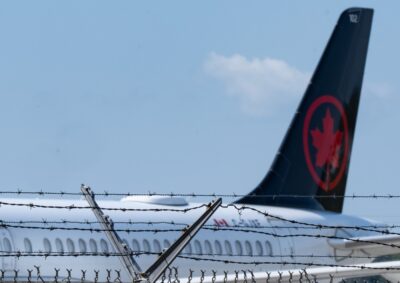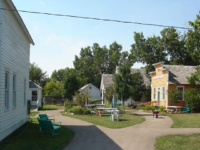In the news today: Air Canada flight attendants picketing at airports
By Canadian Press on August 11, 2025.

Here is a roundup of stories from The Canadian Press designed to bring you up to speed…
Air Canada flight attendants picketing at airports
Air Canada flight attendants are expected to picket at airports in four major Canadian cities in what their union is calling a national day of action.
The Canadian Union of Public Employees says demonstrations are expected to take place at Montreal’s Pierre Elliott Trudeau International Airport, Toronto Pearson International Airport, Vancouver International Airport and Calgary International Airport, all at 1 p.m. ET.
CUPE says it is looking to raise awareness about what it calls “poverty wages” and unpaid labour when working on a plane when it’s not in the air.
CUPE says the Air Canada component of the union was set to return to bargaining talks with the airline on Friday after its members voted 99.7 per cent in favour of a strike mandate.
The vote, which wrapped last Tuesday, means flight attendants could possibly walk off the job as soon as Aug. 16 at 12:01 a.m. with at least 72 hours’ notice provided.
Here’s what else we’re watching…
Heat warnings issued throughout Canada
Another day of punishing heat and humidity is expected to hit Ontario, Quebec and the four Atlantic provinces.
A heat warning from Environment Canada remains in effect for all of southern Ontario, stretching north past Lake Huron and Georgian Bay and east through southern Quebec.
Expected daytime highs could reach 35 degrees Celsius in some parts, with the humidex at or near 40 C.
Hot conditions are also washing over Atlantic Canada, with most of New Brunswick, Nova Scotia, Prince Edward Island and parts of Newfoundland and Labrador also under a heat warning.
In British Columbia, heat warnings are also in place for most of Vancouver Island, the Sunshine Coast, as well as southern B-C’s Fraser Canyon, South Thompson and South Okanagan areas.
Ruling on appeal of Sask. pronoun law challenge
The Saskatchewan Court of Appeal is expected to rule today on the province’s appeal of a decision to allow a challenge of its school pronoun law.
A judge ruled last year that the court challenge could continue, despite the government’s use of the notwithstanding clause.
The law, which came into force in 2023, requires parental consent if children under 16 want to change their names or pronouns at school.
Lawyers for the LGBTQ+ group UR Pride brought forward the challenge, arguing the law causes irreparable harm to gender diverse youth and its case should move ahead.
The government has argued its use of the notwithstanding clause to bring the law into force should end the court challenge.
Public servant elected as MP for Trois-Rivières
Out of the many federal public servants who ran as candidates in the last federal election, only one was elected: Caroline Desrochers, the Liberal member of Parliament for Trois-Rivières, Que.
Originally from Montreal, Desrochers worked at Global Affairs Canada for almost 25 years; her first posting was in Haiti. She later worked for about a decade on Canada-U.S. relations and was posted to New York during U.S. President Donald Trump’s first mandate.
“I always knew one day I would want to do that,” Desrochers said of entering politics, adding that she was interested in doing work that felt closer to people.
Desrochers ran for the Liberals in the La Prairie riding in 2021 but was defeated by Bloc Québécois candidate Alain Therrien.
Desrochers said her experience in dealing with the Americans on steel and aluminum tariffs and her outreach with the U.S. Congress will be valuable in this “consequential” moment.
Study maps ‘megathrust’ quake zone off B.C. coast
Scientists have captured the first detailed images of the meeting of two tectonic plates off the coast of northern British Columbia, an area they say has the potential to generate the largest “megathrust” earthquakes and tsunamis.
The images confirm what appears to be a rare geological occurrence, a subduction zone in its “infancy,” the study by U.S. and Canadian researchers shows.
The paper, in the peer-reviewed journal Science Advances, says the Queen Charlotte plate boundary features the beginnings of such a zone, where one plate slides under the other.
The plate boundary that extends from the southern tip of Haida Gwaii to southeast Alaska was the site of Canada’s two largest earthquakes in recent history — a magnitude-8.1 quake in 1949 and the magnitude-7.8 quake in 2012.
Co-author Michael Bostock, a professor in the department of earth, ocean and atmospheric sciences at the University of B.C., says it’s likely the area will see more “thrust” quakes, and the next one could be larger as the fault grows.
This report by The Canadian Press was first published August 11, 2025.
The Canadian Press
37-36




